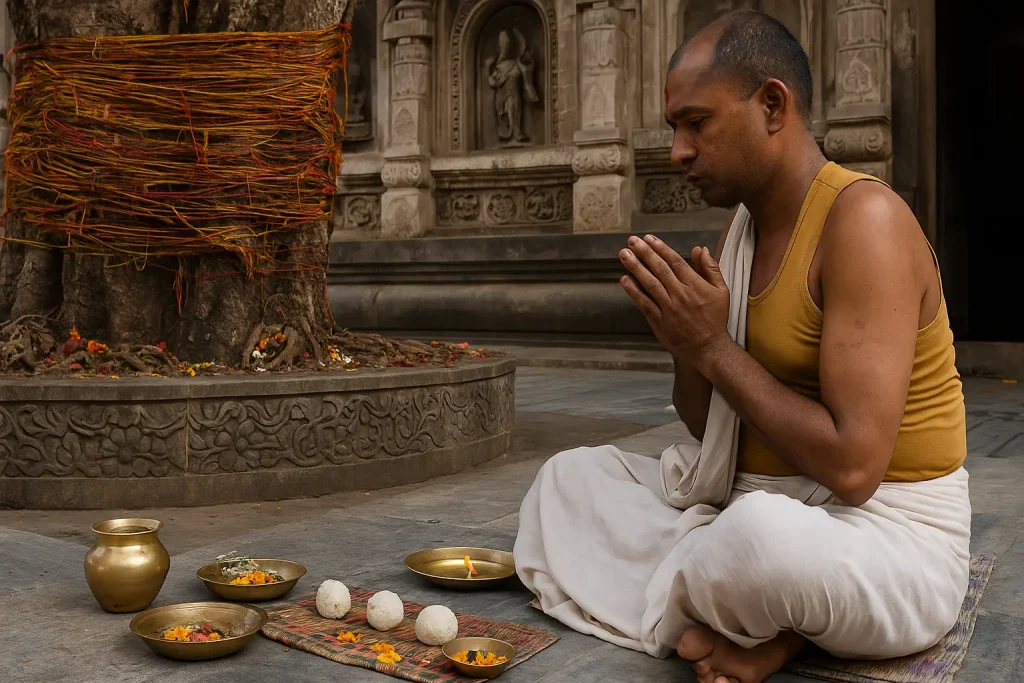
Have you ever wondered why Pitru Paksha is observed in Hindu tradition? Why, every year for 16 consecutive days, rituals like Shraddha, Tarpan, and Pind Daan are performed with such devotion? Behind this lies a deep mythological story, timeless spiritual significance, and a reminder of our eternal bond with our ancestors.
In this blog, let us dive into the meaning, importance, rituals, and sacred sites associated with Pitru Paksha.
This year, 2025 Pitru Paksha is celebrated Sun, 7 Sept, 2025 – Sun, 21 Sept, 2025
What is Pitru Paksha?
Pitru Paksha, also known as Shraddha Paksha, begins on the day after Bhadrapada Purnima and continues until Ashwin Amavasya.
This sacred period lasts for 16 days, and each day is dedicated to specific ancestors. During these days, Hindus perform rituals like Shraddha, Tarpan, and Pind Daan to ensure peace and liberation of the departed souls.
These offerings are not mere rituals—they are acts of love, remembrance, and gratitude for those who gave us life.
Why is Pitru Paksha Observed?
It is believed that during this time, the gates of Pitru Lok (the realm of ancestors) open, and the souls of our forefathers visit their descendants.
To satisfy them and bring peace to their souls, descendants offer food, water, and donations. In return, the ancestors bless their families with protection, prosperity, and well-being.
A Story from the Mahabharata: The Lesson of Karna
The Mahabharata gives us a beautiful lesson about the importance of Ann Daan (donating food).
When Karna, the great warrior, died and reached heaven, he was offered gold and silver but no food. Surprised, he asked Yama, the god of death:
“Why am I not given food?”
Yama replied:
“All your life you gave away wealth and riches, but you never donated food.”
Realizing his mistake, Karna was sent back to earth for 15 days to perform Shraddha and Ann Daan for his ancestors. From then on, the tradition of offering food during Pitru Paksha became an essential practice.
This story teaches us that feeding others is the highest form of charity, one that even the gods value above all.
Rules and Precautions During Pitru Paksha
Certain disciplines are followed strictly during these 16 days:
- Avoid meat, alcohol, and tobacco.
- Stay away from anger, lies, and disrespecting others.
- Feeding Brahmins, the needy, and hungry people is considered very auspicious.
By following these rules, the rituals become more powerful and spiritually effective.
The Spiritual Importance of Pitru Paksha
Scriptures say:
“Without satisfying the ancestors, even the gods are not pleased.”
This means that before worshiping deities, we must first honor our forefathers.
The rituals of Pitru Paksha not only grant peace and liberation (moksha) to departed souls but also remove Pitru Dosha (ancestral karmic imbalance) from the lives of descendants. Families performing these rites with devotion receive blessings of health, prosperity, long life, and harmony.
Main Rituals of Pitru Paksha
During Pitru Paksha, four primary rituals are performed:
- Tarpan – Offering water mixed with sesame seeds (til) and sacred kush grass to ancestors.
- Pind Daan – Offering rice, wheat, and sesame balls (pinds) to departed souls.
- Brahmin Bhoj – Feeding Brahmins, providing them with clothes, and giving dakshina (donation).
- Charity (Daan & Punya) – Donating essentials such as food, clothes, cows, water, and other items.
Each of these acts helps to satisfy the ancestors, who in turn bless their descendants with peace, wealth, and spiritual growth.
Sacred Places for Pitru Shraddha in India
Over centuries, certain places in India have been regarded as especially sacred for performing Pitru Paksha rituals. Here are the most significant ones:
1. Gaya, Bihar – Vishnupad Temple
- Known as the holiest site for Pind Daan.
- Located on the banks of the Falgu River.
- According to legend, a demon named Gayasur performed severe penance and became so powerful that even touching him granted liberation. The gods, fearing his power, sought Lord Vishnu’s help. Vishnu placed his footprint on Gayasur’s chest, sanctifying the spot.
- Today, the Vishnupad Temple marks this place, and performing Shraddha here grants peace to souls and removes Pitru Dosha.
2. Pushkar, Rajasthan – Brahma Temple & Pushkar Lake
- The world’s only famous temple dedicated to Lord Brahma.
- According to legend, Brahma performed a yajna with his second wife Gayatri when Savitri (his first wife) was late. Angered, Savitri cursed Brahma that he would not be worshiped anywhere except Pushkar.
- However, she declared that Shraddha rituals performed at Pushkar would always satisfy ancestors.
- Hence, Pushkar remains a major center for Pitru Shraddha.
3. Siddhpur, Gujarat – Bindu Sarovar
- Known as the most sacred place for Matru Shraddha (rituals dedicated to mothers).
- Legend says Lord Parshurama performed Shraddha for his mother Renuka here, at the holy Bindu Sarovar.
- Since then, Siddhpur has been regarded as the foremost site for honoring mothers during Pitru Paksha.
4. Trimbakeshwar, Nashik, Maharashtra
- Famous for Pitru Dosha Nivaran.
- Located near the Godavari River, thousands perform Pitru rituals here every year.
- It is believed that Shraddha at Trimbakeshwar removes obstacles in life and brings blessings of long life, wealth, and prosperity from the ancestors.
5. Kashi (Varanasi, UP) & Ujjain (Madhya Pradesh)
- Kashi is known as the Moksha Dham. Performing Pind Daan here is believed to grant liberation to souls.
- In Ujjain, near the Mahakaleshwar Temple, Pitru Tarpan rituals are performed with the belief that they elevate the ancestors to Shivlok and Vaikunth.
The Deeper Message of Pitru Paksha
These sacred places are not just religious destinations—they are spiritual bridges connecting us with our forefathers.
By performing Shraddha and Tarpan at these sites, ancestors attain peace, and descendants are freed from Pitru Dosha, leading to peace, harmony, and prosperity in the family.
Pitru Paksha reminds us that our life is not just our own—it is a continuation of those who came before us. By honoring them, we not only repay our debt of gratitude but also ensure blessings for our future generations.
Conclusion
Those who observe Pitru Paksha with devotion are blessed by both Lord Vishnu and their ancestors. Their families experience abundance, harmony, and spiritual upliftment.
So, dear friends, let us remember that honoring our ancestors is as important as worshiping the gods. May this Pitru Paksha bring peace to our forefathers and prosperity to all our homes.





